 |
 |
 |
|
|
 |
 |
 |



What he’s Done:
Coached cross country at York High School in Illinois for 50 years
Won 26 Illinois state cross country titles, and 20 cross county national championships, including the initial NTN in 2004
Coached track and field at York and won the team state championship there too
On life after college and the service: I got a job in Waterman, Illinois, which is a tiny town up by DeKalb, which is about 60 miles from Chicago. I was there for two years. It was one of those schools with 125 students, K-12. I was the head basketball (coach). I was the head track. I was the head cross country. I was the head baseball. I was the intramural director. I was the athletic director. I taught Algebra, Geometry, PE—everything. I read in the paper—this would be like June of ’56—the longtime athletic director and track and field coach at York High School in Elmhurst was retiring. I applied for that job and I was fortunate that the guy (in charge of hiring) was from Northwestern. There were about 75 guys who applied for the job and I was a Northwestern guy and so I got that job at York. And when I had gotten the job at Waterman, the principal was a Northwestern guy, so both of the jobs I’ve gotten in life I’ve gotten because I went to Northwestern.
|
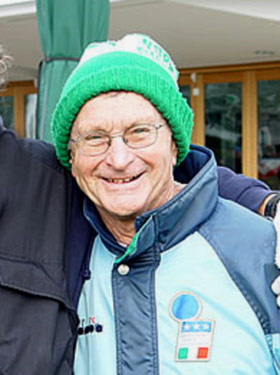
| Longtime York, Illinois coach Joe Newton
Photo by Donna Dye
|
It’s hard to believe that I’ve been coaching 50 years. This will be my 50th year in cross at York—my 54th year at York, but my 50th year as the cross country guy.
I was a devotee of Arthur Lydiard and over the years I had him to my home in the three or four times he came to America. I picked his brain. I was a devotee of Bowerman and I learned all of his stuff. Then Igloi, the guy from Hungary and I picked his brain. Then I put it all together and became close friends with Peter Coe and Sebastian Coe and I got all of my sprint training for distance running from them. Then the last guy was Dr. Joe Vigil who was the coach at Adams State for 30 years. He had Pat Porter who won eight straight AAU cross country championships. We became close friends, like brothers, and he taught me all of his VO2 Max training. He was the (Olympic) distance coach in ’88 in Seoul and I was the assistant manager and we roomed together and I picked his brain. From those people I combined all that stuff and got my own system and put it together and, dang, it works. Our program is pretty solid because it came from some pretty famous people.
I can remember when I first started. Nobody thought about marathon training, which Arthur Lydiard brought here with Peter Snell. We were just light years ahead of everybody else. They all thought that I was killing my guys and that they were overtraining and doing too much work. It was tough making it, but we survived and everyone looks at our program as not too bad.
On what Lydiard taught him: He taught me that you can do far more than you ever thought you could do. At that time, he was like 45 years old and he was training himself, experiment on himself, and running between 200-250 miles a week. Then he got Peter Snell on 100 miles a week. But he told me this, and I’ll never forget this, he told me that—he was sitting across the dinner table from me, I had him at my house for about a week—and he told me, “Joe, everybody thinks we’re running 100 miles a week, but I don’t tell them that in that 100 miles a week I don’t count the morning run, I don’t count the warm up and I don’t count the cool down. So everybody thinks that they can run 100 miles a week and beat us. Hell, Peter’s running 200 miles a week.”
More on Lydiard: He taught me that if you believe in something and buy into the program, you can do so much more than you thought. When you get all of that background, you don’t get hurt when you start doing the fast training because you have all of that strength and stamina.
I’ve got all of the workouts Seb Coe took for the six months prior to the 1984 Olympics Games, so we mix that in with Lydiard’s training.
Igloi was a firm believer in 110’s. He used to train guys to run one hundred 110’s to get ready for the marathon. Way back when I started we were doing 40, 50, 60 110’s. We are down now to where we run 20. We’ve learned a little bit that we don’t have to do all of that.
|
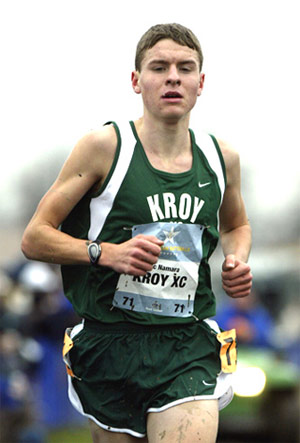
| Running for 'Kroy XC,' Sean McNamara led York to a
title in the inaugural Nike Team Nationals in 2004
Photo by PhotoRun |
On the 'secrets' to coaching: Here’s what I really learned and this is the whole secret. Most of the people I know who are coaches, they know a lot about running, but they don’t know how to coach. Arthur Lydiard told me the secret to coaching is you got to have your guys ready on the day. I tell my guys we are coaching you to run your best when it counts. We may not win early, and I also learned from Arthur Lydiard—when I first started coaching, before I hooked up with him, I used to plan my workouts from the first day to the last day—and he taught me that you start from the day you want to win the title and work backwards so you get all of your stuff in right before the meet that you want to do. After that, in 1963, we started making our program from the state meet and worked back to the first day of the season.
Here’s the next thing. This is the second big secret about coaching. Kids don’t care if you are an Olympic runner, the world’s greatest man, the strongest man in the world, or if you’ve got four PhD’s in exercise physiology. They don’t want to hear it until they find out that you care about them. Once they find out that you care about them, they will do anything for you. That is the secret. There has to be a relationship between you and your athletes. If they think you are just using them to promote your record, they won’t do squat for you. We have 200-225 guys on our cross country team. Only seven can run at the state meet. What the heck are all of those other guys doing? They are out there because at York we have created a culture that is based on excellence and toughness. We have an espirit de corp second to none. The Marine Corps never leave a guy in combat and we’re kind of like that. When a guy runs in a race, I tell them, ‘You’re not just running for yourself and York High School. You’re running for every guy who has come through this program and won those 26 state titles.’
I don’t know how the run the Internet. I don’t have a computer. I have a red pen, that’s it.
The next secret to coaching. My wife and I got married in 1952. For the first 15 years that we were married, the only free time that I had was at Christmas time because I was always coaching. We would go to Miami Beach. And the guy who ran the pool at the hotel—we would come out to the pool deck and if you wanted to have a mat on your chair, he’d get you a mat and you’d tip him. Then you’d go away for a year. You come back the next year, the pool guy has not seen you for a year, and we’d come on to the pool deck and the guy would say, “Mr. and Mrs. Newton, how are you doing?” I’d tip him $20 because he called my name out and everybody around the pool is looking at me. I said, “How can you remember my name?” He said, “That’s my business. Does it make you feel good when I call your name out?” I said, “Yeah, I just gave you $20.” He said, “You got it.” From the pool guy, I learned that people wanted to hear their name.
When I first started coaching we had 20, 25 guys and now, 50 years later, 200, 225, but I tried every single day, one time during practice, to call a guy’s name out. Now we’re up to about 1963 and I had a freshman guy on my team who solidified what this guy at the pool taught me. Here’s this Malinkoff guy and out of about 20 freshmen, he was 20. He was terrible, six-three, slew-foot, slow, but every day he’d come out to practice and sometime during that practice, I would say, “Malinkoff, you’re looking great.” Well, I was just kind of flipping that out, kind of joking. After his freshman year of cross country, his folks moved to Miami in December. One year later, about December of the next year, I get a letter from Malinkoff down in Florida. He said, ‘Coach Newton, I’m down here in Florida and I’m not running anymore. It’s not the same here as it was at York. I knew that I was the worst freshman on the team, but I could hardly wait to get to practice every day because I knew that sometime during that practice you’d say, “Malinkoff, you’re looking great.” That just drove me to do anything you wanted me to do. Now, I came down to Miami and nobody called my name, so I quit.’
High school guys, if they are busting their ass, they want to know that you are watching.
|
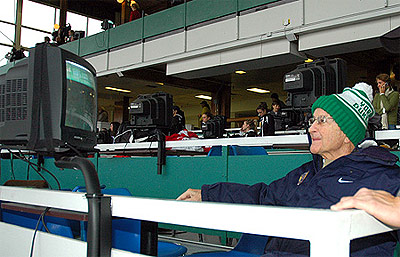
| Unable to coach his team at Nike Nationals, Coach Newton takes a seat
in the Portland Meadows grandstand and watches with other fans.
Photo by Donna Dye
|
On checking in: Every day they have to check in with me. I have the roll book, so they’ve got to come up to me and I have a nickname for everybody. That’s another tip. Everybody has a personal nickname that I call them. So they’ll check in and they won’t say “Smith”, they’ll say, “Bonehead here, or Meatball here,” because that’s personal. I look them in the eye and check them in. That’s my first contact. Then I call their name out during practice. Then I make every guy, at the end of practice, walk up to me and say, “Checking out Coach Newton.” I say, “Checking out, Smith” and I shake his hand. If they’ve got a cold or I’ve got a cold, we touch elbows.
It’s like a family. We even have guys on our team that used to play football. We have such camaraderie. I say, “We win together, we lose together and if we win a state title, you are all part of that.” It’s the culture that we’ve got. The guys know that every single day they come to practice they’re going to get some tender, loving, care. They’ve got someplace to go where they know there’s an old guy out there who cares about them.
On reading: I’m an avid reader. I have about 3,000 books I’ve purchased over the years in my library. I have read about Abraham Lincoln. I was reading this in the ‘40’s or ‘50’s and he said that ‘whenever I make a decision in life, no matter what it is, immediately 50% of the people think I’m right and 50% think I’m wrong, so I follow my course to the end.’ That really helped me early on in my career because when we were really kicking ass and doing all of the Lydiard training, all of these other coaches were saying, ‘He’s crazy. He’s killing his guys. They never run in college.’ Last year, I had 35 guys running in colleges all over America. Then we’d kick their ass again and they’d say that ‘he was too mean. They have to run in the summer. What the hell is he doing?’ And I would think of Abraham Lincoln and that got me through the early times. Now, I just turned 80, so all of the guys who used to hate me are, “How you doing Coach Newton? Are you okay?” They feel sorry for me because I’m so old. Things change.
The first day of practice every year, I say to the kids, “Now listen to me. Here’s the deal. If I can ask you three questions and you can answer “yes”, that’s cool. And you can ask me the same three questions and if I can say “yes” then we’ve got something going. Question one, can I trust you? I say, you God-dang know you can trust me. Can I trust you? Question two: You know I’m committed to excellence when I get up at 4:30 in the morning to drive here at my age to coach you guys all summer. You know I’m committed. Are you committed to excellence? The third one is, you know damn well that I care about you and I love you and if you care about me, we’ve got something going.
|
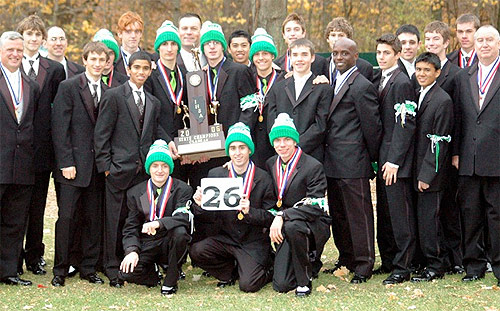
| The York squad which claimed "Number 26" in 2006. Will this be the year for Number 27?
Photo by Rich Gonzalez
|
We’ve got a culture of excellence and toughness, and our guys are tough.
I’ve got a good entourage. I’ve got 25 managers. One guy is the picture guy, one guy is the movie guy, ten or twelve guys are timing, another guy is running the med kit, another guy is recording everything, three or four guys are doing the typing, so everybody has a job. Everybody is important and everybody gets credit for any wins or losses.
Does he still get nervous after 50 years? Absolutely. No matter how much you’ve prepared—in our state meet we start at one end of the field and you run maybe 600 yards and then you take a 180 degree turn and come right back in the direction you were just running. You get to that first turn, if you get caught on the inside, you get run over. You stop. Guys are knocking your shoes off. You’ve got to run to the right. Well, there are 45 boxes. If you get box one way to the left side, if you don’t get your ass out, you’ll get crushed. If you get yourself out and you go out too fast, you die. Every year, I pray that we get an outside box, so we can run straight ahead and get around that turn. Last year, we had box eight and I told our guys you had to take a 1000-1 and go to the right and get to the right. They took a 1000-1, but instead of going way to the right, they took it right up the middle. They get down to the first turn and, except for my two top guys that got 2nd and 3rd, were in oblivion. They came out of the first turn and were like 150th out of 200. We ended up losing the state meet by one point! So, yeah, I get nervous because of the situation. But I never worry about our conditioning. It’s just whether we can get around the first turn. If we get around the first turn, I know we are ok.
Success is being able to do your best when it counts the most.
I have a saying that makes them laugh. I say, “When you are running fast, run faster.”
Guys will come back 30 years later and say, “I didn’t understand then, but I’m teaching my sons what you taught me, that every day you’ve got to do the best you can with what you’ve got.”
You’ve got to dispel that Newton never has any college runners. I’ve had about 15 guys be Big 10 Champions, school record holders, most valuable, but all those rumors, ‘those guys are burned out from York, they never run in college’—they are full of crap. Marius Bakken came to me from Norway. He has run in two Olympic Games and two world championships. How many (high school) coaches have had guys run Olympics?
|
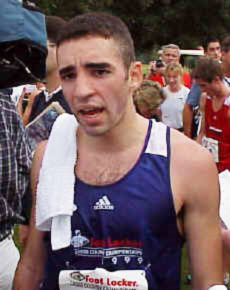
| Best he ever coached: Donald Sage
Photo by John Dye, FL Nationals 1999
|
On Don Sage: He is the best runner that I ever had. At the state meet, and this is fully electronic, he ran 8:42.7 (Editor’s note: He ran 8:42.9 for 3,200 meters) and then he came back and ran 4:07.3. The state record for fully electronic was 8:42.6. The state record in the mile was 4:07.1 (Editor’s note: The state record for the 1,600 meters was 4:07.45. Sage ran 4:07.58). Talk about decisions that affected me. The worst coaching decision I ever made—because we were trying to win the state track title that year and we had never won one in all of the years that I had been there and we ended up winning it—but I told Donald, “Don’t lead in the two-mile.” There was a kid from West Chicago who went on and ran four years at Wisconsin (Tim Keller). I said, “Don’t lead, Donald, you have to come back and win the mile, we are trying to win the state meet.” Donald runs his last quarter in 58. Keller runs 72. Donald runs 8:42.7. Keller runs 8:56 and looks like a bum. But if I hadn’t told Donald, “Don’t lead” he would have run in the 8:30’s and broken the national record and the state record, but I held him back and he came back and won the mile and we won the state meet with 74 points.
At York, when you get second it’s like a funeral. In town, expectations are high. We come back and they say, ‘You only got second? What’s going on?’
Thank god this year we’ve got an old-fashioned York team, eight guys who can run within 15 seconds, under 15 minutes for three miles, so we’ll be in the hunt this year again.
Parting words: Here’s another thing I learned from reading. Plato, over 2,000 years ago, said, ‘The duty of education—and take that word out and say, ‘the duty of coaching'-- is to make good people,’ because good people act nobly. That’s my goal. I’m trying to make good people that will act nobly and go on to be doctors and lawyers. That’s the story of coaching. It’s more than running.
|
|
|
|
|
|
 |
 |